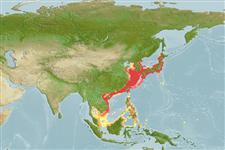Common names from other countries
Environment: milieu / climate zone / depth range / distribution range
Ecologia
marino demersale; oceanodromo (Ref. 51243); distribuzione batimetrica 10 - 200 m (Ref. 11230). Subtropical; 62°N - 1°N, 99°E - 163°E (Ref. 54698)
Western Pacific: Japan, Sakhalin, Kuril Islands, Korean Peninsula to the South China Sea.
Length at first maturity / Size / Peso / Age
Maturity: Lm ?, range 40 - ? cm
Max length : 103 cm TL maschio/sesso non determinato; (Ref. 40637); peso massimo pubblicato: 9.1 kg (Ref. 40637)
Spine dorsali (totale): 0; Raggi dorsali molli (totale): 77-81; Spine anali 0; Raggi anali molli: 59 - 61; Vertebre: 38
Most highly prized of the Japanese flounders.
Distinct pairing (Ref. 205).
Masuda, H., K. Amaoka, C. Araga, T. Uyeno and T. Yoshino, 1984. The fishes of the Japanese Archipelago. Vol. 1. Tokai University Press, Tokyo, Japan. 437 p. (text). (Ref. 559)
IUCN Red List Status (Ref. 130435)
CITES (Ref. 128078)
Not Evaluated
Threat to humans
Harmless
Human uses
Pesca: elevato interesse commerciale; Acquacoltura: commerciale
Strumenti
Special reports
Download XML
Fonti Internet
Estimates based on models
Preferred temperature (Ref.
115969): 8.6 - 25, mean 18.8 (based on 241 cells).
Phylogenetic diversity index (Ref.
82804): PD
50 = 0.5000 [Uniqueness, from 0.5 = low to 2.0 = high].
Bayesian length-weight: a=0.00794 (0.00438 - 0.01441), b=3.07 (2.90 - 3.24), in cm Total Length, based on LWR estimates for this species & (Sub)family-body (Ref.
93245).
Trophic level (Ref.
69278): 4.5 ±0.8 se; based on diet studies.
Resilienza (Ref.
120179): Medio, tempo minimo di raddoppiamento della popolazione 1.4 - 4.4 anni (tm=3; Fec= 3 million).
Fishing Vulnerability (Ref.
59153): High vulnerability (60 of 100).
Climate Vulnerability (Ref.
125649): Moderate vulnerability (43 of 100).
